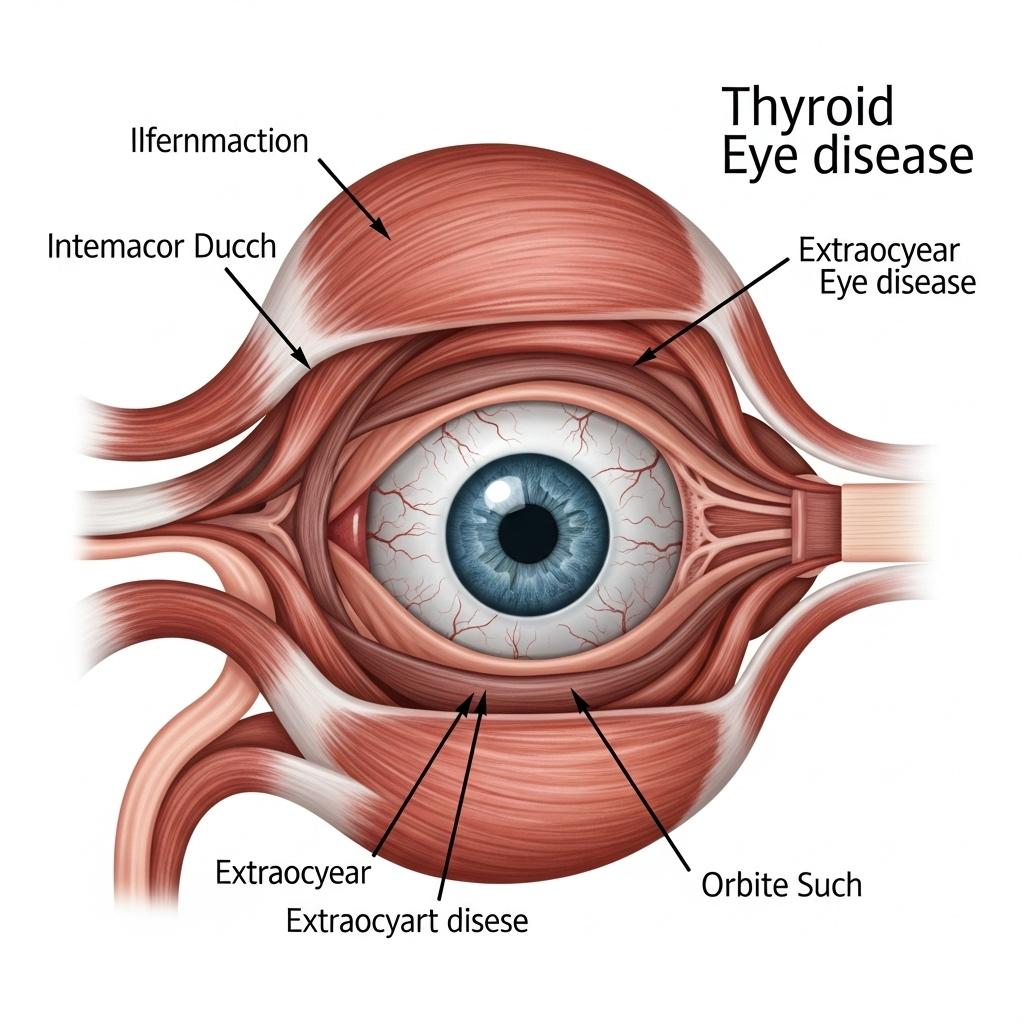Managing Proptosis and Double Vision in Thyroid Eye Disease

Thyroid Eye Disease (TED), also known as Graves’ orbitopathy or thyroid-associated ophthalmopathy, is a rare autoimmune condition where the immune system mistakenly attacks the tissues around the eyes. Most commonly associated with Graves’ disease, TED can also occur in hypothyroid or euthyroid individuals, making timely recognition essential even in atypical presentations.
TED primarily causes inflammation and expansion of the extraocular muscles and orbital fat, leading to visible eye bulging (proptosis), double vision (diplopia), eyelid retraction, pain, redness, and in severe cases, vision loss. These symptoms can significantly impair the patient’s quality of life and functional ability, underscoring the need for early diagnosis and multidisciplinary care.
Request a sample copy of the CI report at:
https://www.datamintelligence.com/strategic-insights/sample/thyroid-eye-disease-ted
Pathophysiology and Risk Factors
The immune-mediated mechanism in TED is driven by autoantibodies that target the thyrotropin receptor (TSHR) and insulin-like growth factor-1 receptor (IGF-1R) on orbital fibroblasts. This leads to fibroblast activation, cytokine release, and tissue remodeling, resulting in inflammation, fat expansion, and fibrosis.
TED is most frequently seen in patients with Graves’ hyperthyroidism, though it may develop in those with Hashimoto’s thyroiditis or even in patients with no overt thyroid dysfunction.
Risk factors include:
1. Smoking (the most significant modifiable risk factor)
2. Female ***
3. Age between 30–50
4. Radioactive iodine therapy (can transiently worsen TED)
5. Poorly controlled thyroid function
6. Genetic predisposition
Phases and Clinical Manifestations
TED progresses through two phases:
1. Active Phase (Inflammatory): Lasts 6–24 months, marked by orbital pain, swelling, redness, tearing, and visual changes.
2. Inactive Phase (Fibrotic): Characterized by stabilization of symptoms but with residual structural changes such as proptosis or lid retraction.
Symptoms can include:
1. Eyelid retraction and lag
2. Grittiness and excessive tearing
3. Bulging eyes (exophthalmos)
4. Double vision (diplopia)
5. Optic nerve compression in severe cases (compressive optic neuropathy)
6. Diagnosis and Severity Assessment
Diagnosis is primarily clinical, supported by:
1. Thyroid function tests (TSH, T3, T4)
2. Orbital imaging (CT or MRI showing enlarged extraocular muscles with tendon sparing)
3. Thyroid autoantibody panels (TSI, TRAb)
Severity is classified using systems like the Clinical Activity Score (CAS) or EUGOGO classification to guide therapy decisions.
Treatment Approaches: From Stabilization to Restoration
The treatment of TED requires coordinated care between endocrinologists and ophthalmologists. The goals are to reduce inflammation, preserve vision, and restore appearance and function.
1. Control of Thyroid Dysfunction:
Achieving and maintaining an euthyroid state is critical. Antithyroid medications, radioactive iodine (with steroid prophylaxis), or thyroidectomy may be employed.
2. Immunomodulatory Therapy:
For moderate-to-severe active disease:
* Intravenous corticosteroids (first-line)
* Teprotumumab: A targeted IGF-1R inhibitor, FDA-approved for active TED, significantly reduces proptosis and inflammation
* Rituximab, tocilizumab, and mycophenolate mofetil are considered in select cases
* Orbital radiation may be used to reduce inflammation and diplopia
3. Surgical Interventions:
In the inactive phase, reconstructive surgery may be needed:
* Orbital decompression
* Strabismus surgery for diplopia
* Eyelid correction procedures
Living with TED: Patient-Centered Management
Patient education plays a key role. Smoking cessation, consistent thyroid monitoring, and regular eye evaluations are crucial. Lubricating eye drops, prism glasses, and psychological support can help patients cope with functional and aesthetic challenges.
Multidisciplinary TED clinics are emerging as a model for optimized, holistic care.
Read the full CI Insights report: https://www.datamintelligence.com/strategic-insights/thyroid-eye-disease-ted
Future Directions: Personalized Immunotherapy and Early Detection
Emerging therapies targeting the autoimmune pathway are redefining TED management.
Investigational agents include:
1. FcRn inhibitors to reduce pathogenic antibody levels
2. JAK inhibitors to modulate proinflammatory signaling
3. B-cell and T-cell targeted therapies for immune rebalancing
Precision medicine, aided by biomarkers, may allow stratification of patients based on severity, activity, and risk of progression, enabling early intervention and prevention of irreversible changes.
About DataM Intelligence
DataM Intelligence 4Market Research LLP delivers real-time competitive intelligence across autoimmune, immunologic, and rare disease spaces. Our insights span clinical pipelines, regulatory benchmarks, and commercialization strategies for stakeholders in global life sciences.
🔗 Visit: www.datamintelligence.com
- Art
- Causes
- Crafts
- Dance
- Drinks
- Film
- Fitness
- Food
- Spellen
- Gardening
- Health
- Home
- Literature
- Music
- Networking
- Other
- Party
- Religion
- Shopping
- Sports
- Theater
- Wellness


